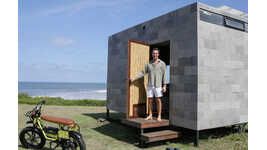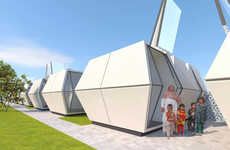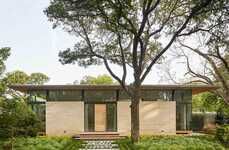The scenic locales of rural Indonesia are set to play host to a remarkable three-story bamboo home that makes use of locally derived bamboo and stone as well as recycled plastic, making for a truly spectacular and elegant structure that also promotes eco-friendly ideals.
Named Piyandeling and designed by Realrich Architecture Workshop, this particular home has a bamboo exterior that is enveloped by recycled plastic. The plastic paneling serves to sheath the inner bamboo layer whilst also aiding in ventilation and insulation of the overall structure.
This bamboo home's visual aesthetic as well as its functionality are aided by its raised posture which makes use of bamboo stilts, under which a parking garage is available.
Triple-Tier Bamboo Homes
This Indonesian Dwelling Uses Local Bamboo & Recycled Plastic Panels
Trend Themes
1. Eco-friendly Architecture - The use of locally derived bamboo and recycled plastic as building materials promote eco-friendly ideals and open up opportunities to innovate more sustainable building practices.
2. Innovative Use of Bamboo in Buildings - The triple-tier bamboo home showcases the potential for bamboo to be used as a primary building material, potentially disrupting the traditional use of hardwood and other materials commonly used in construction.
3. Vertical Living Spaces - The multi-story bamboo home's raised posture, made possible by bamboo stilts, offers opportunities to reimagine vertical living spaces, particularly in densely populated urban areas.
Industry Implications
1. Architecture and Construction - The innovative use of bamboo and recycled plastic in the Piyandeling home showcase opportunities for green building practices and eco-friendly architecture.
2. Sustainable Materials Production - As the use of locally sourced, eco-friendly materials becomes more prevalent in the construction industry, there may be opportunities to develop sustainable materials production and recycling processes to meet demand.
3. Real Estate and Property Development - The innovative design of the Piyandeling home and its focus on sustainable building practices offer opportunities to disrupt traditional real estate and property development practices by prioritizing eco-friendly and sustainable architecture.




